Vodafone: Ethical Analysis of Gender Pay Gap and Business Practices
VerifiedAdded on 2023/01/16
|11
|3781
|98
Essay
AI Summary
This essay examines the gender pay gap at Vodafone, a major ethical issue within the telecommunications company. It begins by defining the problem and its contributing factors, then analyzes the role of the business in society, identifies key stakeholders impacted by the pay gap (employees, managers, investors, customers, and government), and provides examples of both ethical and unethical business practices. The essay then offers specific recommendations for Vodafone to address the issue, such as conducting skill-based salary assessments and implementing structured interview processes. Furthermore, it explores the application of normative and descriptive ethical theories to understand and address the problem, including their advantages, disadvantages, and practical applications within the organization. Finally, the essay reflects on ethical leadership and the maintenance of integrity and compliance in an unethical business environment, concluding with a summary of the key findings and suggestions for improvement.

Essay
Paraphrase This Document
Need a fresh take? Get an instant paraphrase of this document with our AI Paraphraser
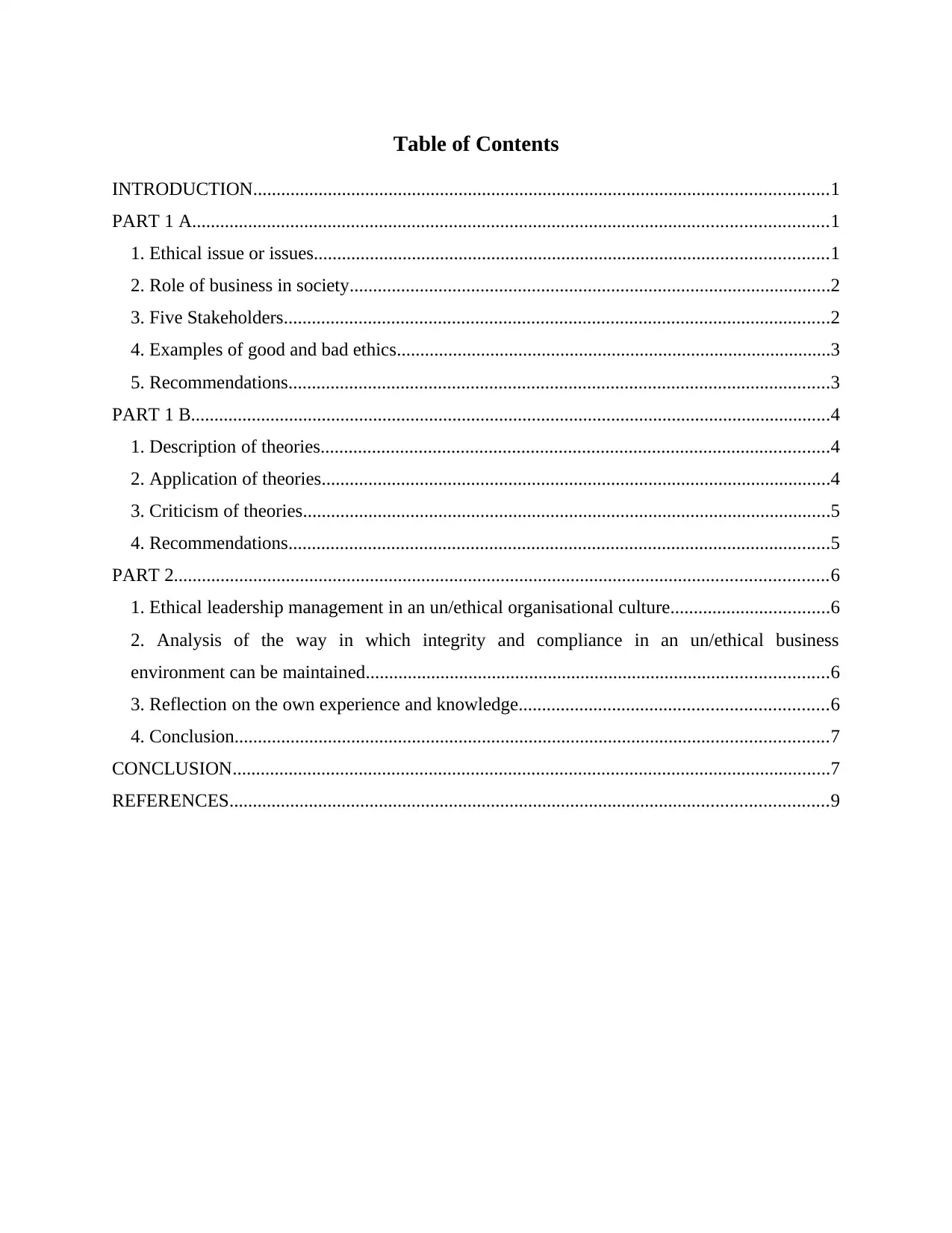
Table of Contents
INTRODUCTION...........................................................................................................................1
PART 1 A........................................................................................................................................1
1. Ethical issue or issues..............................................................................................................1
2. Role of business in society.......................................................................................................2
3. Five Stakeholders.....................................................................................................................2
4. Examples of good and bad ethics.............................................................................................3
5. Recommendations....................................................................................................................3
PART 1 B.........................................................................................................................................4
1. Description of theories.............................................................................................................4
2. Application of theories.............................................................................................................4
3. Criticism of theories.................................................................................................................5
4. Recommendations....................................................................................................................5
PART 2............................................................................................................................................6
1. Ethical leadership management in an un/ethical organisational culture..................................6
2. Analysis of the way in which integrity and compliance in an un/ethical business
environment can be maintained...................................................................................................6
3. Reflection on the own experience and knowledge..................................................................6
4. Conclusion...............................................................................................................................7
CONCLUSION................................................................................................................................7
REFERENCES................................................................................................................................9
INTRODUCTION...........................................................................................................................1
PART 1 A........................................................................................................................................1
1. Ethical issue or issues..............................................................................................................1
2. Role of business in society.......................................................................................................2
3. Five Stakeholders.....................................................................................................................2
4. Examples of good and bad ethics.............................................................................................3
5. Recommendations....................................................................................................................3
PART 1 B.........................................................................................................................................4
1. Description of theories.............................................................................................................4
2. Application of theories.............................................................................................................4
3. Criticism of theories.................................................................................................................5
4. Recommendations....................................................................................................................5
PART 2............................................................................................................................................6
1. Ethical leadership management in an un/ethical organisational culture..................................6
2. Analysis of the way in which integrity and compliance in an un/ethical business
environment can be maintained...................................................................................................6
3. Reflection on the own experience and knowledge..................................................................6
4. Conclusion...............................................................................................................................7
CONCLUSION................................................................................................................................7
REFERENCES................................................................................................................................9
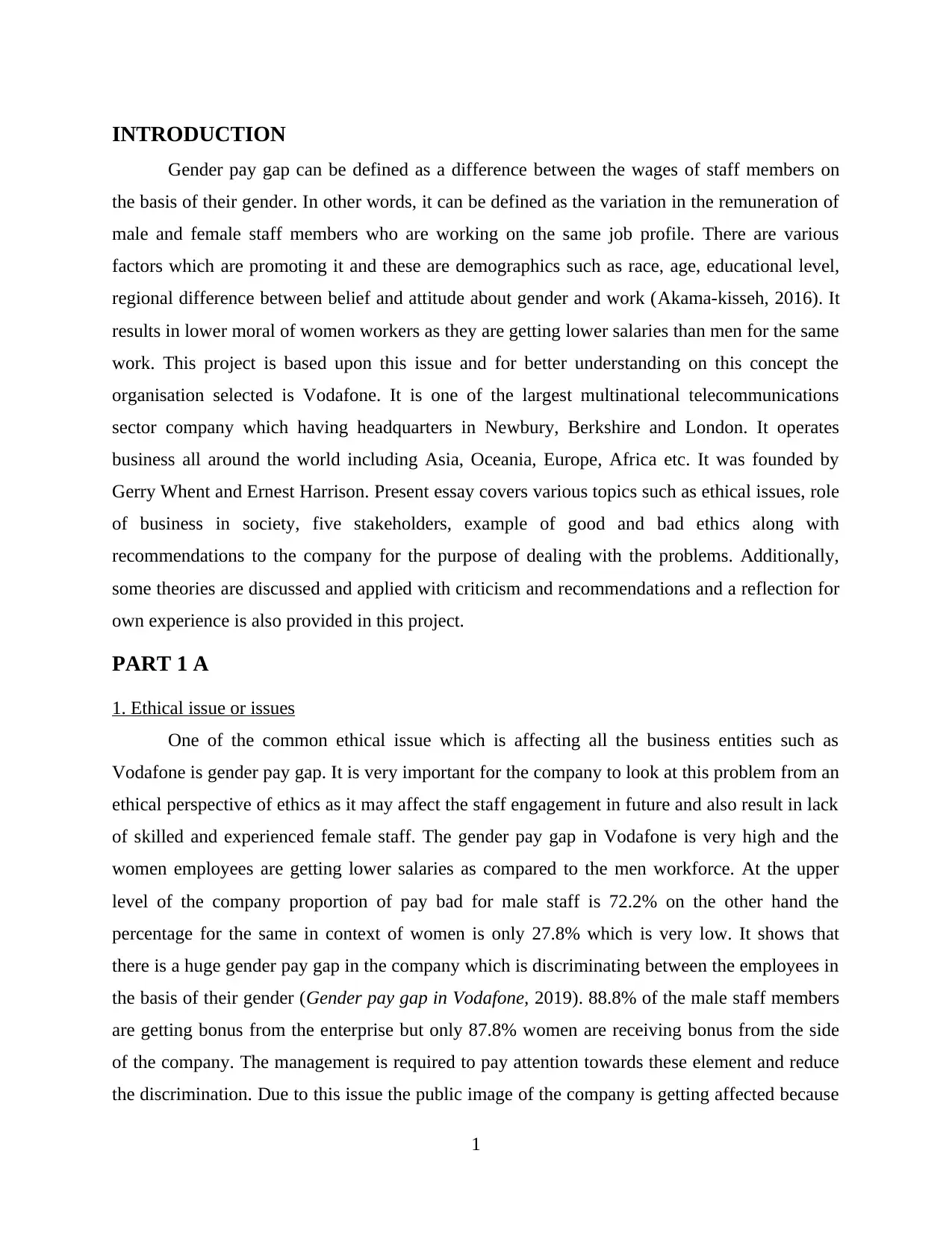
INTRODUCTION
Gender pay gap can be defined as a difference between the wages of staff members on
the basis of their gender. In other words, it can be defined as the variation in the remuneration of
male and female staff members who are working on the same job profile. There are various
factors which are promoting it and these are demographics such as race, age, educational level,
regional difference between belief and attitude about gender and work (Akama-kisseh, 2016). It
results in lower moral of women workers as they are getting lower salaries than men for the same
work. This project is based upon this issue and for better understanding on this concept the
organisation selected is Vodafone. It is one of the largest multinational telecommunications
sector company which having headquarters in Newbury, Berkshire and London. It operates
business all around the world including Asia, Oceania, Europe, Africa etc. It was founded by
Gerry Whent and Ernest Harrison. Present essay covers various topics such as ethical issues, role
of business in society, five stakeholders, example of good and bad ethics along with
recommendations to the company for the purpose of dealing with the problems. Additionally,
some theories are discussed and applied with criticism and recommendations and a reflection for
own experience is also provided in this project.
PART 1 A
1. Ethical issue or issues
One of the common ethical issue which is affecting all the business entities such as
Vodafone is gender pay gap. It is very important for the company to look at this problem from an
ethical perspective of ethics as it may affect the staff engagement in future and also result in lack
of skilled and experienced female staff. The gender pay gap in Vodafone is very high and the
women employees are getting lower salaries as compared to the men workforce. At the upper
level of the company proportion of pay bad for male staff is 72.2% on the other hand the
percentage for the same in context of women is only 27.8% which is very low. It shows that
there is a huge gender pay gap in the company which is discriminating between the employees in
the basis of their gender (Gender pay gap in Vodafone, 2019). 88.8% of the male staff members
are getting bonus from the enterprise but only 87.8% women are receiving bonus from the side
of the company. The management is required to pay attention towards these element and reduce
the discrimination. Due to this issue the public image of the company is getting affected because
1
Gender pay gap can be defined as a difference between the wages of staff members on
the basis of their gender. In other words, it can be defined as the variation in the remuneration of
male and female staff members who are working on the same job profile. There are various
factors which are promoting it and these are demographics such as race, age, educational level,
regional difference between belief and attitude about gender and work (Akama-kisseh, 2016). It
results in lower moral of women workers as they are getting lower salaries than men for the same
work. This project is based upon this issue and for better understanding on this concept the
organisation selected is Vodafone. It is one of the largest multinational telecommunications
sector company which having headquarters in Newbury, Berkshire and London. It operates
business all around the world including Asia, Oceania, Europe, Africa etc. It was founded by
Gerry Whent and Ernest Harrison. Present essay covers various topics such as ethical issues, role
of business in society, five stakeholders, example of good and bad ethics along with
recommendations to the company for the purpose of dealing with the problems. Additionally,
some theories are discussed and applied with criticism and recommendations and a reflection for
own experience is also provided in this project.
PART 1 A
1. Ethical issue or issues
One of the common ethical issue which is affecting all the business entities such as
Vodafone is gender pay gap. It is very important for the company to look at this problem from an
ethical perspective of ethics as it may affect the staff engagement in future and also result in lack
of skilled and experienced female staff. The gender pay gap in Vodafone is very high and the
women employees are getting lower salaries as compared to the men workforce. At the upper
level of the company proportion of pay bad for male staff is 72.2% on the other hand the
percentage for the same in context of women is only 27.8% which is very low. It shows that
there is a huge gender pay gap in the company which is discriminating between the employees in
the basis of their gender (Gender pay gap in Vodafone, 2019). 88.8% of the male staff members
are getting bonus from the enterprise but only 87.8% women are receiving bonus from the side
of the company. The management is required to pay attention towards these element and reduce
the discrimination. Due to this issue the public image of the company is getting affected because
1
⊘ This is a preview!⊘
Do you want full access?
Subscribe today to unlock all pages.

Trusted by 1+ million students worldwide
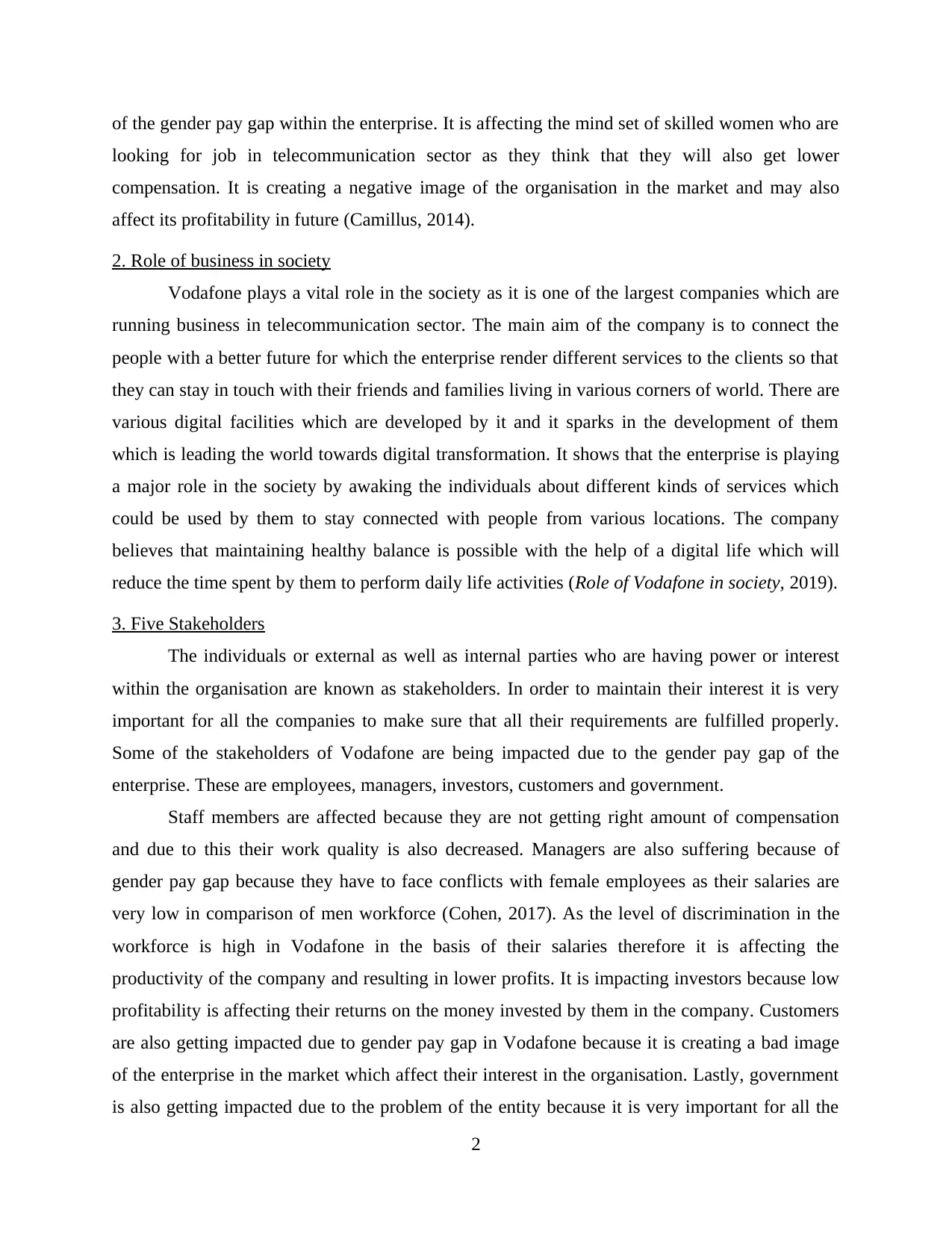
of the gender pay gap within the enterprise. It is affecting the mind set of skilled women who are
looking for job in telecommunication sector as they think that they will also get lower
compensation. It is creating a negative image of the organisation in the market and may also
affect its profitability in future (Camillus, 2014).
2. Role of business in society
Vodafone plays a vital role in the society as it is one of the largest companies which are
running business in telecommunication sector. The main aim of the company is to connect the
people with a better future for which the enterprise render different services to the clients so that
they can stay in touch with their friends and families living in various corners of world. There are
various digital facilities which are developed by it and it sparks in the development of them
which is leading the world towards digital transformation. It shows that the enterprise is playing
a major role in the society by awaking the individuals about different kinds of services which
could be used by them to stay connected with people from various locations. The company
believes that maintaining healthy balance is possible with the help of a digital life which will
reduce the time spent by them to perform daily life activities (Role of Vodafone in society, 2019).
3. Five Stakeholders
The individuals or external as well as internal parties who are having power or interest
within the organisation are known as stakeholders. In order to maintain their interest it is very
important for all the companies to make sure that all their requirements are fulfilled properly.
Some of the stakeholders of Vodafone are being impacted due to the gender pay gap of the
enterprise. These are employees, managers, investors, customers and government.
Staff members are affected because they are not getting right amount of compensation
and due to this their work quality is also decreased. Managers are also suffering because of
gender pay gap because they have to face conflicts with female employees as their salaries are
very low in comparison of men workforce (Cohen, 2017). As the level of discrimination in the
workforce is high in Vodafone in the basis of their salaries therefore it is affecting the
productivity of the company and resulting in lower profits. It is impacting investors because low
profitability is affecting their returns on the money invested by them in the company. Customers
are also getting impacted due to gender pay gap in Vodafone because it is creating a bad image
of the enterprise in the market which affect their interest in the organisation. Lastly, government
is also getting impacted due to the problem of the entity because it is very important for all the
2
looking for job in telecommunication sector as they think that they will also get lower
compensation. It is creating a negative image of the organisation in the market and may also
affect its profitability in future (Camillus, 2014).
2. Role of business in society
Vodafone plays a vital role in the society as it is one of the largest companies which are
running business in telecommunication sector. The main aim of the company is to connect the
people with a better future for which the enterprise render different services to the clients so that
they can stay in touch with their friends and families living in various corners of world. There are
various digital facilities which are developed by it and it sparks in the development of them
which is leading the world towards digital transformation. It shows that the enterprise is playing
a major role in the society by awaking the individuals about different kinds of services which
could be used by them to stay connected with people from various locations. The company
believes that maintaining healthy balance is possible with the help of a digital life which will
reduce the time spent by them to perform daily life activities (Role of Vodafone in society, 2019).
3. Five Stakeholders
The individuals or external as well as internal parties who are having power or interest
within the organisation are known as stakeholders. In order to maintain their interest it is very
important for all the companies to make sure that all their requirements are fulfilled properly.
Some of the stakeholders of Vodafone are being impacted due to the gender pay gap of the
enterprise. These are employees, managers, investors, customers and government.
Staff members are affected because they are not getting right amount of compensation
and due to this their work quality is also decreased. Managers are also suffering because of
gender pay gap because they have to face conflicts with female employees as their salaries are
very low in comparison of men workforce (Cohen, 2017). As the level of discrimination in the
workforce is high in Vodafone in the basis of their salaries therefore it is affecting the
productivity of the company and resulting in lower profits. It is impacting investors because low
profitability is affecting their returns on the money invested by them in the company. Customers
are also getting impacted due to gender pay gap in Vodafone because it is creating a bad image
of the enterprise in the market which affect their interest in the organisation. Lastly, government
is also getting impacted due to the problem of the entity because it is very important for all the
2
Paraphrase This Document
Need a fresh take? Get an instant paraphrase of this document with our AI Paraphraser
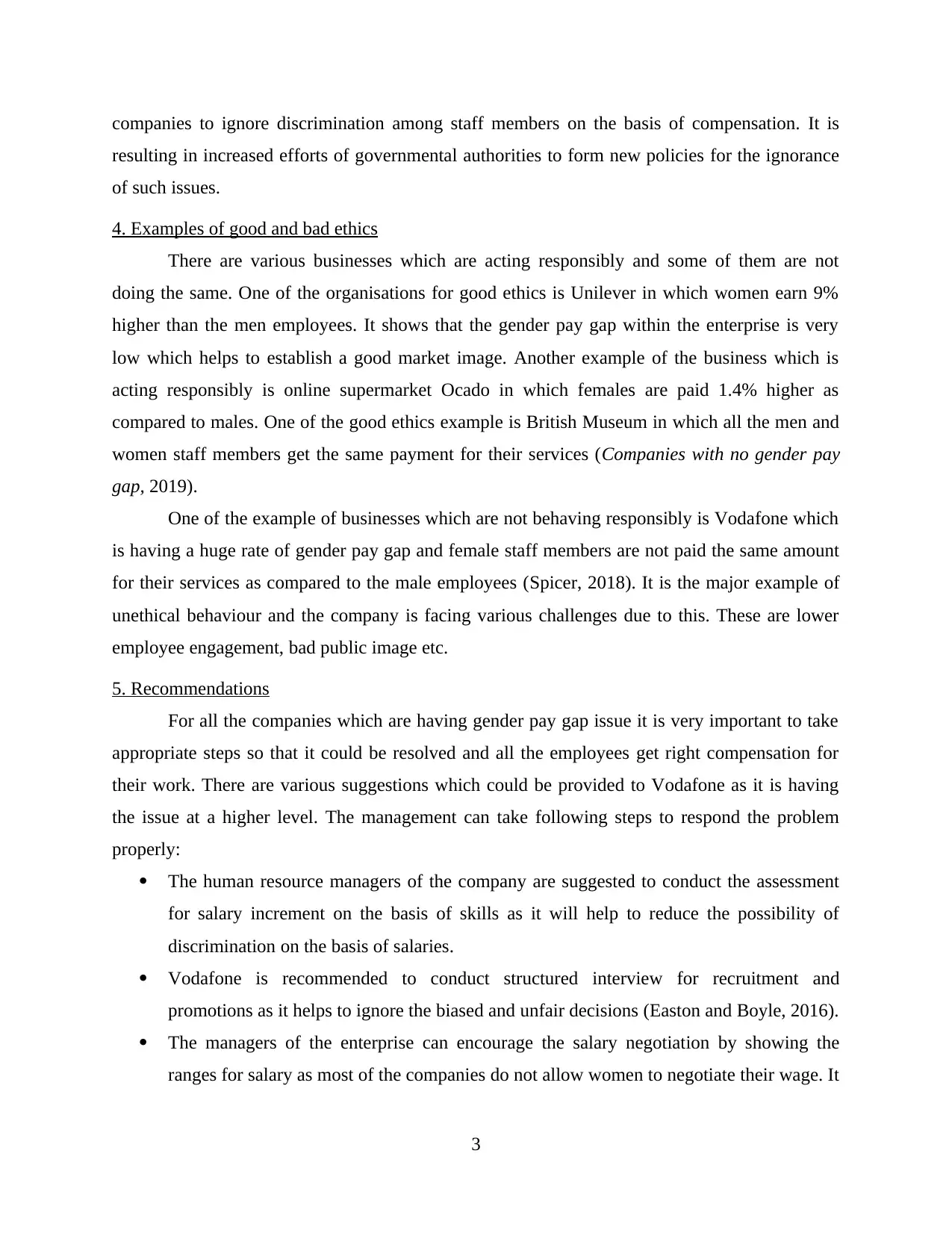
companies to ignore discrimination among staff members on the basis of compensation. It is
resulting in increased efforts of governmental authorities to form new policies for the ignorance
of such issues.
4. Examples of good and bad ethics
There are various businesses which are acting responsibly and some of them are not
doing the same. One of the organisations for good ethics is Unilever in which women earn 9%
higher than the men employees. It shows that the gender pay gap within the enterprise is very
low which helps to establish a good market image. Another example of the business which is
acting responsibly is online supermarket Ocado in which females are paid 1.4% higher as
compared to males. One of the good ethics example is British Museum in which all the men and
women staff members get the same payment for their services (Companies with no gender pay
gap, 2019).
One of the example of businesses which are not behaving responsibly is Vodafone which
is having a huge rate of gender pay gap and female staff members are not paid the same amount
for their services as compared to the male employees (Spicer, 2018). It is the major example of
unethical behaviour and the company is facing various challenges due to this. These are lower
employee engagement, bad public image etc.
5. Recommendations
For all the companies which are having gender pay gap issue it is very important to take
appropriate steps so that it could be resolved and all the employees get right compensation for
their work. There are various suggestions which could be provided to Vodafone as it is having
the issue at a higher level. The management can take following steps to respond the problem
properly:
The human resource managers of the company are suggested to conduct the assessment
for salary increment on the basis of skills as it will help to reduce the possibility of
discrimination on the basis of salaries.
Vodafone is recommended to conduct structured interview for recruitment and
promotions as it helps to ignore the biased and unfair decisions (Easton and Boyle, 2016).
The managers of the enterprise can encourage the salary negotiation by showing the
ranges for salary as most of the companies do not allow women to negotiate their wage. It
3
resulting in increased efforts of governmental authorities to form new policies for the ignorance
of such issues.
4. Examples of good and bad ethics
There are various businesses which are acting responsibly and some of them are not
doing the same. One of the organisations for good ethics is Unilever in which women earn 9%
higher than the men employees. It shows that the gender pay gap within the enterprise is very
low which helps to establish a good market image. Another example of the business which is
acting responsibly is online supermarket Ocado in which females are paid 1.4% higher as
compared to males. One of the good ethics example is British Museum in which all the men and
women staff members get the same payment for their services (Companies with no gender pay
gap, 2019).
One of the example of businesses which are not behaving responsibly is Vodafone which
is having a huge rate of gender pay gap and female staff members are not paid the same amount
for their services as compared to the male employees (Spicer, 2018). It is the major example of
unethical behaviour and the company is facing various challenges due to this. These are lower
employee engagement, bad public image etc.
5. Recommendations
For all the companies which are having gender pay gap issue it is very important to take
appropriate steps so that it could be resolved and all the employees get right compensation for
their work. There are various suggestions which could be provided to Vodafone as it is having
the issue at a higher level. The management can take following steps to respond the problem
properly:
The human resource managers of the company are suggested to conduct the assessment
for salary increment on the basis of skills as it will help to reduce the possibility of
discrimination on the basis of salaries.
Vodafone is recommended to conduct structured interview for recruitment and
promotions as it helps to ignore the biased and unfair decisions (Easton and Boyle, 2016).
The managers of the enterprise can encourage the salary negotiation by showing the
ranges for salary as most of the companies do not allow women to negotiate their wage. It
3
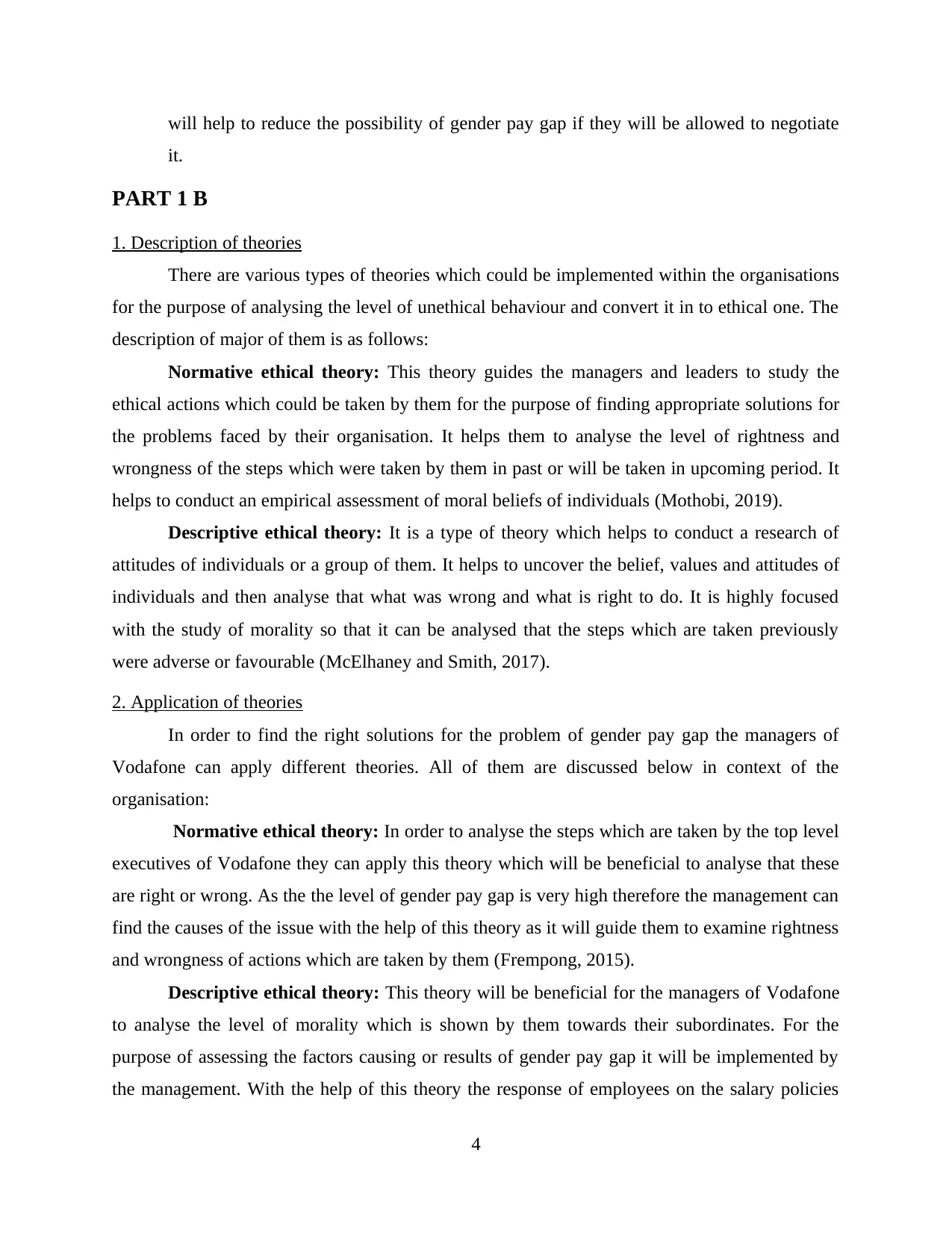
will help to reduce the possibility of gender pay gap if they will be allowed to negotiate
it.
PART 1 B
1. Description of theories
There are various types of theories which could be implemented within the organisations
for the purpose of analysing the level of unethical behaviour and convert it in to ethical one. The
description of major of them is as follows:
Normative ethical theory: This theory guides the managers and leaders to study the
ethical actions which could be taken by them for the purpose of finding appropriate solutions for
the problems faced by their organisation. It helps them to analyse the level of rightness and
wrongness of the steps which were taken by them in past or will be taken in upcoming period. It
helps to conduct an empirical assessment of moral beliefs of individuals (Mothobi, 2019).
Descriptive ethical theory: It is a type of theory which helps to conduct a research of
attitudes of individuals or a group of them. It helps to uncover the belief, values and attitudes of
individuals and then analyse that what was wrong and what is right to do. It is highly focused
with the study of morality so that it can be analysed that the steps which are taken previously
were adverse or favourable (McElhaney and Smith, 2017).
2. Application of theories
In order to find the right solutions for the problem of gender pay gap the managers of
Vodafone can apply different theories. All of them are discussed below in context of the
organisation:
Normative ethical theory: In order to analyse the steps which are taken by the top level
executives of Vodafone they can apply this theory which will be beneficial to analyse that these
are right or wrong. As the the level of gender pay gap is very high therefore the management can
find the causes of the issue with the help of this theory as it will guide them to examine rightness
and wrongness of actions which are taken by them (Frempong, 2015).
Descriptive ethical theory: This theory will be beneficial for the managers of Vodafone
to analyse the level of morality which is shown by them towards their subordinates. For the
purpose of assessing the factors causing or results of gender pay gap it will be implemented by
the management. With the help of this theory the response of employees on the salary policies
4
it.
PART 1 B
1. Description of theories
There are various types of theories which could be implemented within the organisations
for the purpose of analysing the level of unethical behaviour and convert it in to ethical one. The
description of major of them is as follows:
Normative ethical theory: This theory guides the managers and leaders to study the
ethical actions which could be taken by them for the purpose of finding appropriate solutions for
the problems faced by their organisation. It helps them to analyse the level of rightness and
wrongness of the steps which were taken by them in past or will be taken in upcoming period. It
helps to conduct an empirical assessment of moral beliefs of individuals (Mothobi, 2019).
Descriptive ethical theory: It is a type of theory which helps to conduct a research of
attitudes of individuals or a group of them. It helps to uncover the belief, values and attitudes of
individuals and then analyse that what was wrong and what is right to do. It is highly focused
with the study of morality so that it can be analysed that the steps which are taken previously
were adverse or favourable (McElhaney and Smith, 2017).
2. Application of theories
In order to find the right solutions for the problem of gender pay gap the managers of
Vodafone can apply different theories. All of them are discussed below in context of the
organisation:
Normative ethical theory: In order to analyse the steps which are taken by the top level
executives of Vodafone they can apply this theory which will be beneficial to analyse that these
are right or wrong. As the the level of gender pay gap is very high therefore the management can
find the causes of the issue with the help of this theory as it will guide them to examine rightness
and wrongness of actions which are taken by them (Frempong, 2015).
Descriptive ethical theory: This theory will be beneficial for the managers of Vodafone
to analyse the level of morality which is shown by them towards their subordinates. For the
purpose of assessing the factors causing or results of gender pay gap it will be implemented by
the management. With the help of this theory the response of employees on the salary policies
4
⊘ This is a preview!⊘
Do you want full access?
Subscribe today to unlock all pages.

Trusted by 1+ million students worldwide
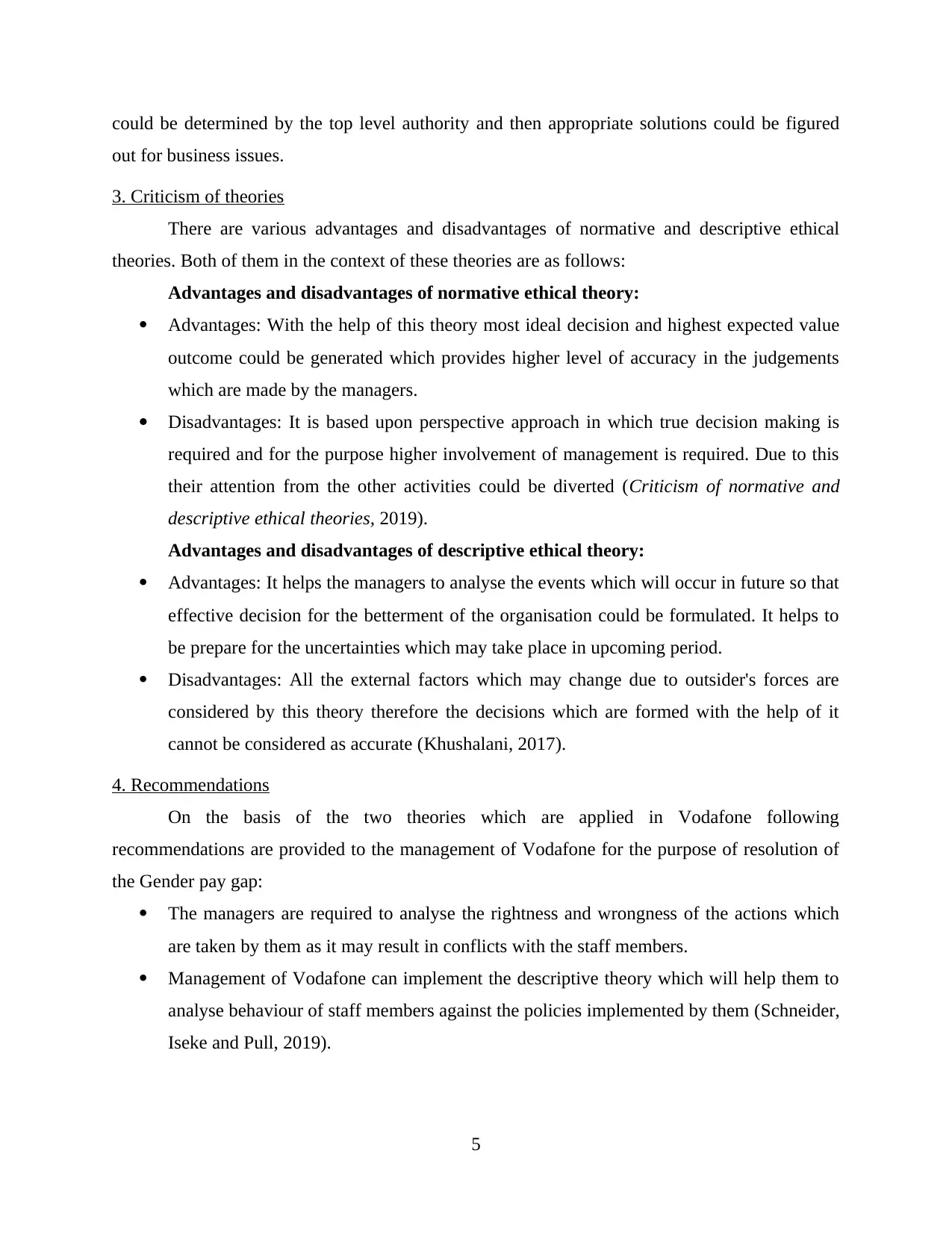
could be determined by the top level authority and then appropriate solutions could be figured
out for business issues.
3. Criticism of theories
There are various advantages and disadvantages of normative and descriptive ethical
theories. Both of them in the context of these theories are as follows:
Advantages and disadvantages of normative ethical theory:
Advantages: With the help of this theory most ideal decision and highest expected value
outcome could be generated which provides higher level of accuracy in the judgements
which are made by the managers.
Disadvantages: It is based upon perspective approach in which true decision making is
required and for the purpose higher involvement of management is required. Due to this
their attention from the other activities could be diverted (Criticism of normative and
descriptive ethical theories, 2019).
Advantages and disadvantages of descriptive ethical theory:
Advantages: It helps the managers to analyse the events which will occur in future so that
effective decision for the betterment of the organisation could be formulated. It helps to
be prepare for the uncertainties which may take place in upcoming period.
Disadvantages: All the external factors which may change due to outsider's forces are
considered by this theory therefore the decisions which are formed with the help of it
cannot be considered as accurate (Khushalani, 2017).
4. Recommendations
On the basis of the two theories which are applied in Vodafone following
recommendations are provided to the management of Vodafone for the purpose of resolution of
the Gender pay gap:
The managers are required to analyse the rightness and wrongness of the actions which
are taken by them as it may result in conflicts with the staff members.
Management of Vodafone can implement the descriptive theory which will help them to
analyse behaviour of staff members against the policies implemented by them (Schneider,
Iseke and Pull, 2019).
5
out for business issues.
3. Criticism of theories
There are various advantages and disadvantages of normative and descriptive ethical
theories. Both of them in the context of these theories are as follows:
Advantages and disadvantages of normative ethical theory:
Advantages: With the help of this theory most ideal decision and highest expected value
outcome could be generated which provides higher level of accuracy in the judgements
which are made by the managers.
Disadvantages: It is based upon perspective approach in which true decision making is
required and for the purpose higher involvement of management is required. Due to this
their attention from the other activities could be diverted (Criticism of normative and
descriptive ethical theories, 2019).
Advantages and disadvantages of descriptive ethical theory:
Advantages: It helps the managers to analyse the events which will occur in future so that
effective decision for the betterment of the organisation could be formulated. It helps to
be prepare for the uncertainties which may take place in upcoming period.
Disadvantages: All the external factors which may change due to outsider's forces are
considered by this theory therefore the decisions which are formed with the help of it
cannot be considered as accurate (Khushalani, 2017).
4. Recommendations
On the basis of the two theories which are applied in Vodafone following
recommendations are provided to the management of Vodafone for the purpose of resolution of
the Gender pay gap:
The managers are required to analyse the rightness and wrongness of the actions which
are taken by them as it may result in conflicts with the staff members.
Management of Vodafone can implement the descriptive theory which will help them to
analyse behaviour of staff members against the policies implemented by them (Schneider,
Iseke and Pull, 2019).
5
Paraphrase This Document
Need a fresh take? Get an instant paraphrase of this document with our AI Paraphraser
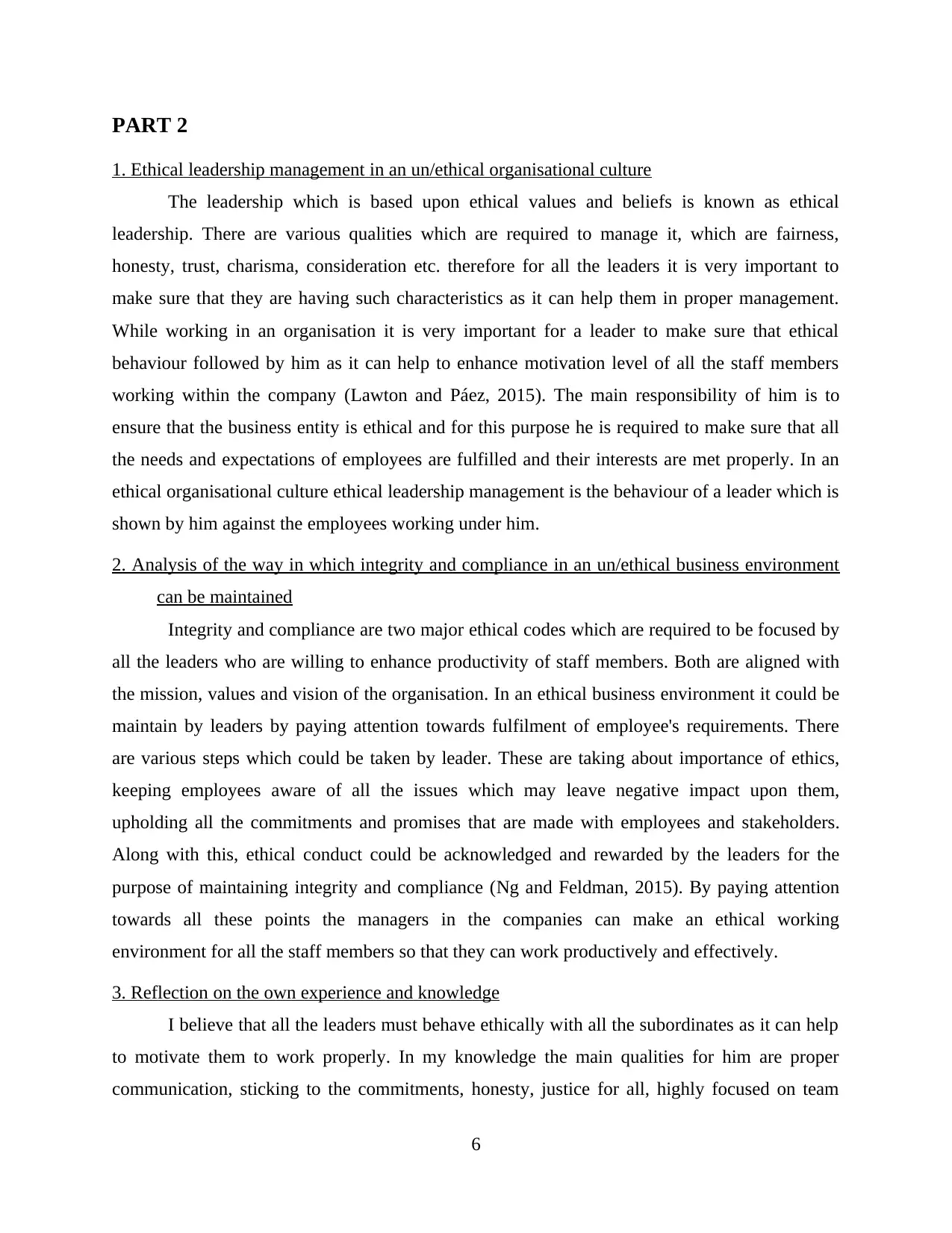
PART 2
1. Ethical leadership management in an un/ethical organisational culture
The leadership which is based upon ethical values and beliefs is known as ethical
leadership. There are various qualities which are required to manage it, which are fairness,
honesty, trust, charisma, consideration etc. therefore for all the leaders it is very important to
make sure that they are having such characteristics as it can help them in proper management.
While working in an organisation it is very important for a leader to make sure that ethical
behaviour followed by him as it can help to enhance motivation level of all the staff members
working within the company (Lawton and Páez, 2015). The main responsibility of him is to
ensure that the business entity is ethical and for this purpose he is required to make sure that all
the needs and expectations of employees are fulfilled and their interests are met properly. In an
ethical organisational culture ethical leadership management is the behaviour of a leader which is
shown by him against the employees working under him.
2. Analysis of the way in which integrity and compliance in an un/ethical business environment
can be maintained
Integrity and compliance are two major ethical codes which are required to be focused by
all the leaders who are willing to enhance productivity of staff members. Both are aligned with
the mission, values and vision of the organisation. In an ethical business environment it could be
maintain by leaders by paying attention towards fulfilment of employee's requirements. There
are various steps which could be taken by leader. These are taking about importance of ethics,
keeping employees aware of all the issues which may leave negative impact upon them,
upholding all the commitments and promises that are made with employees and stakeholders.
Along with this, ethical conduct could be acknowledged and rewarded by the leaders for the
purpose of maintaining integrity and compliance (Ng and Feldman, 2015). By paying attention
towards all these points the managers in the companies can make an ethical working
environment for all the staff members so that they can work productively and effectively.
3. Reflection on the own experience and knowledge
I believe that all the leaders must behave ethically with all the subordinates as it can help
to motivate them to work properly. In my knowledge the main qualities for him are proper
communication, sticking to the commitments, honesty, justice for all, highly focused on team
6
1. Ethical leadership management in an un/ethical organisational culture
The leadership which is based upon ethical values and beliefs is known as ethical
leadership. There are various qualities which are required to manage it, which are fairness,
honesty, trust, charisma, consideration etc. therefore for all the leaders it is very important to
make sure that they are having such characteristics as it can help them in proper management.
While working in an organisation it is very important for a leader to make sure that ethical
behaviour followed by him as it can help to enhance motivation level of all the staff members
working within the company (Lawton and Páez, 2015). The main responsibility of him is to
ensure that the business entity is ethical and for this purpose he is required to make sure that all
the needs and expectations of employees are fulfilled and their interests are met properly. In an
ethical organisational culture ethical leadership management is the behaviour of a leader which is
shown by him against the employees working under him.
2. Analysis of the way in which integrity and compliance in an un/ethical business environment
can be maintained
Integrity and compliance are two major ethical codes which are required to be focused by
all the leaders who are willing to enhance productivity of staff members. Both are aligned with
the mission, values and vision of the organisation. In an ethical business environment it could be
maintain by leaders by paying attention towards fulfilment of employee's requirements. There
are various steps which could be taken by leader. These are taking about importance of ethics,
keeping employees aware of all the issues which may leave negative impact upon them,
upholding all the commitments and promises that are made with employees and stakeholders.
Along with this, ethical conduct could be acknowledged and rewarded by the leaders for the
purpose of maintaining integrity and compliance (Ng and Feldman, 2015). By paying attention
towards all these points the managers in the companies can make an ethical working
environment for all the staff members so that they can work productively and effectively.
3. Reflection on the own experience and knowledge
I believe that all the leaders must behave ethically with all the subordinates as it can help
to motivate them to work properly. In my knowledge the main qualities for him are proper
communication, sticking to the commitments, honesty, justice for all, highly focused on team
6
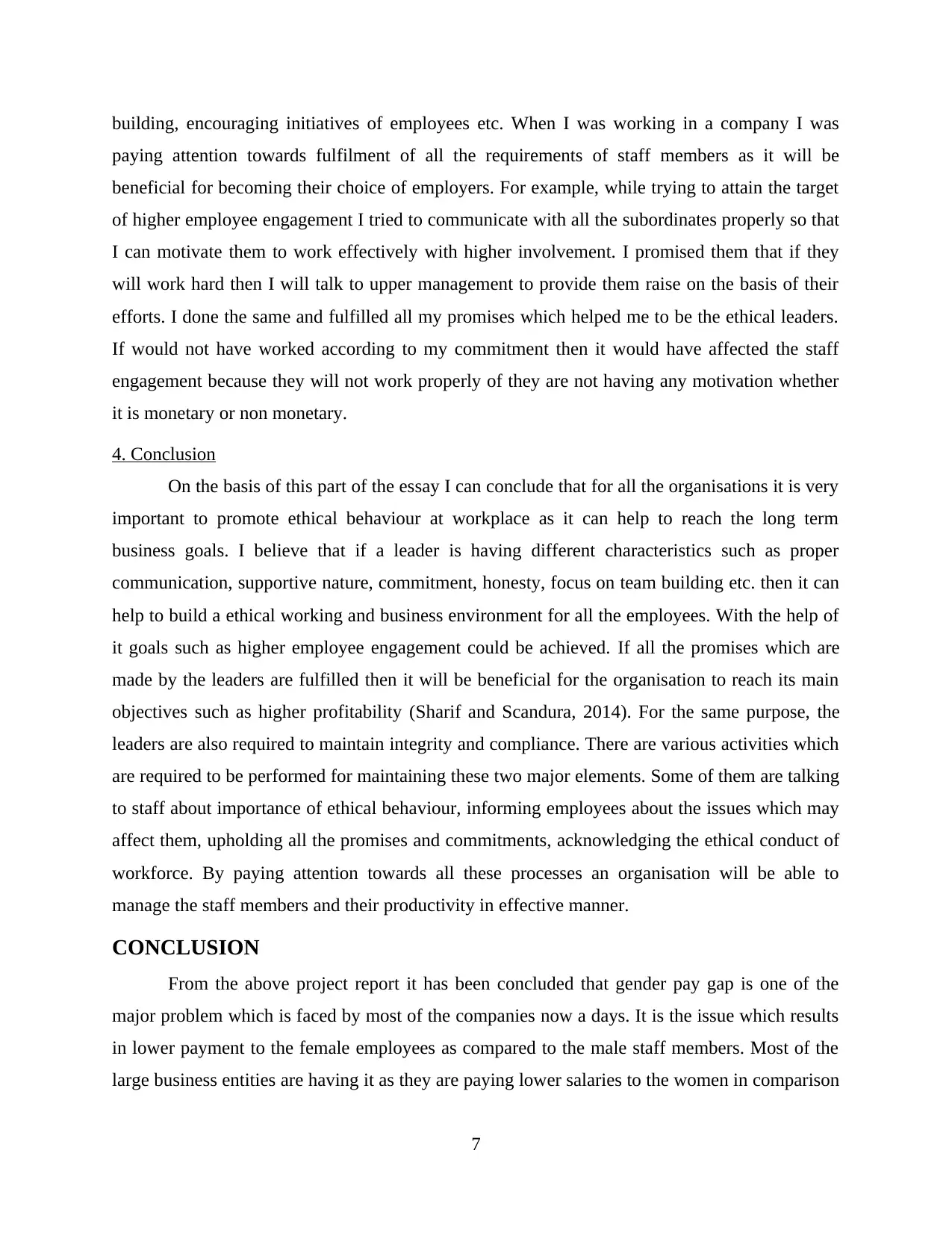
building, encouraging initiatives of employees etc. When I was working in a company I was
paying attention towards fulfilment of all the requirements of staff members as it will be
beneficial for becoming their choice of employers. For example, while trying to attain the target
of higher employee engagement I tried to communicate with all the subordinates properly so that
I can motivate them to work effectively with higher involvement. I promised them that if they
will work hard then I will talk to upper management to provide them raise on the basis of their
efforts. I done the same and fulfilled all my promises which helped me to be the ethical leaders.
If would not have worked according to my commitment then it would have affected the staff
engagement because they will not work properly of they are not having any motivation whether
it is monetary or non monetary.
4. Conclusion
On the basis of this part of the essay I can conclude that for all the organisations it is very
important to promote ethical behaviour at workplace as it can help to reach the long term
business goals. I believe that if a leader is having different characteristics such as proper
communication, supportive nature, commitment, honesty, focus on team building etc. then it can
help to build a ethical working and business environment for all the employees. With the help of
it goals such as higher employee engagement could be achieved. If all the promises which are
made by the leaders are fulfilled then it will be beneficial for the organisation to reach its main
objectives such as higher profitability (Sharif and Scandura, 2014). For the same purpose, the
leaders are also required to maintain integrity and compliance. There are various activities which
are required to be performed for maintaining these two major elements. Some of them are talking
to staff about importance of ethical behaviour, informing employees about the issues which may
affect them, upholding all the promises and commitments, acknowledging the ethical conduct of
workforce. By paying attention towards all these processes an organisation will be able to
manage the staff members and their productivity in effective manner.
CONCLUSION
From the above project report it has been concluded that gender pay gap is one of the
major problem which is faced by most of the companies now a days. It is the issue which results
in lower payment to the female employees as compared to the male staff members. Most of the
large business entities are having it as they are paying lower salaries to the women in comparison
7
paying attention towards fulfilment of all the requirements of staff members as it will be
beneficial for becoming their choice of employers. For example, while trying to attain the target
of higher employee engagement I tried to communicate with all the subordinates properly so that
I can motivate them to work effectively with higher involvement. I promised them that if they
will work hard then I will talk to upper management to provide them raise on the basis of their
efforts. I done the same and fulfilled all my promises which helped me to be the ethical leaders.
If would not have worked according to my commitment then it would have affected the staff
engagement because they will not work properly of they are not having any motivation whether
it is monetary or non monetary.
4. Conclusion
On the basis of this part of the essay I can conclude that for all the organisations it is very
important to promote ethical behaviour at workplace as it can help to reach the long term
business goals. I believe that if a leader is having different characteristics such as proper
communication, supportive nature, commitment, honesty, focus on team building etc. then it can
help to build a ethical working and business environment for all the employees. With the help of
it goals such as higher employee engagement could be achieved. If all the promises which are
made by the leaders are fulfilled then it will be beneficial for the organisation to reach its main
objectives such as higher profitability (Sharif and Scandura, 2014). For the same purpose, the
leaders are also required to maintain integrity and compliance. There are various activities which
are required to be performed for maintaining these two major elements. Some of them are talking
to staff about importance of ethical behaviour, informing employees about the issues which may
affect them, upholding all the promises and commitments, acknowledging the ethical conduct of
workforce. By paying attention towards all these processes an organisation will be able to
manage the staff members and their productivity in effective manner.
CONCLUSION
From the above project report it has been concluded that gender pay gap is one of the
major problem which is faced by most of the companies now a days. It is the issue which results
in lower payment to the female employees as compared to the male staff members. Most of the
large business entities are having it as they are paying lower salaries to the women in comparison
7
⊘ This is a preview!⊘
Do you want full access?
Subscribe today to unlock all pages.

Trusted by 1+ million students worldwide
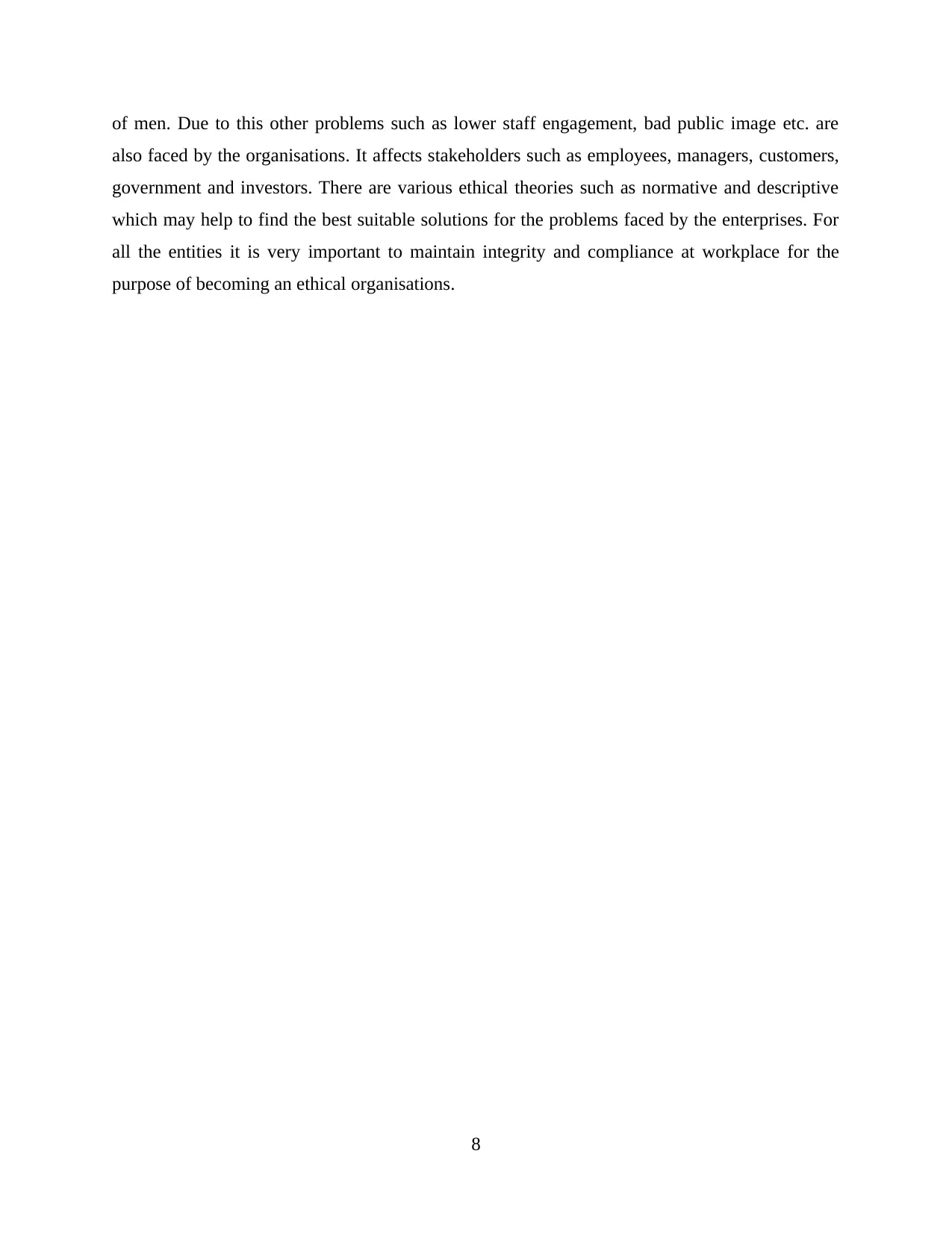
of men. Due to this other problems such as lower staff engagement, bad public image etc. are
also faced by the organisations. It affects stakeholders such as employees, managers, customers,
government and investors. There are various ethical theories such as normative and descriptive
which may help to find the best suitable solutions for the problems faced by the enterprises. For
all the entities it is very important to maintain integrity and compliance at workplace for the
purpose of becoming an ethical organisations.
8
also faced by the organisations. It affects stakeholders such as employees, managers, customers,
government and investors. There are various ethical theories such as normative and descriptive
which may help to find the best suitable solutions for the problems faced by the enterprises. For
all the entities it is very important to maintain integrity and compliance at workplace for the
purpose of becoming an ethical organisations.
8
Paraphrase This Document
Need a fresh take? Get an instant paraphrase of this document with our AI Paraphraser
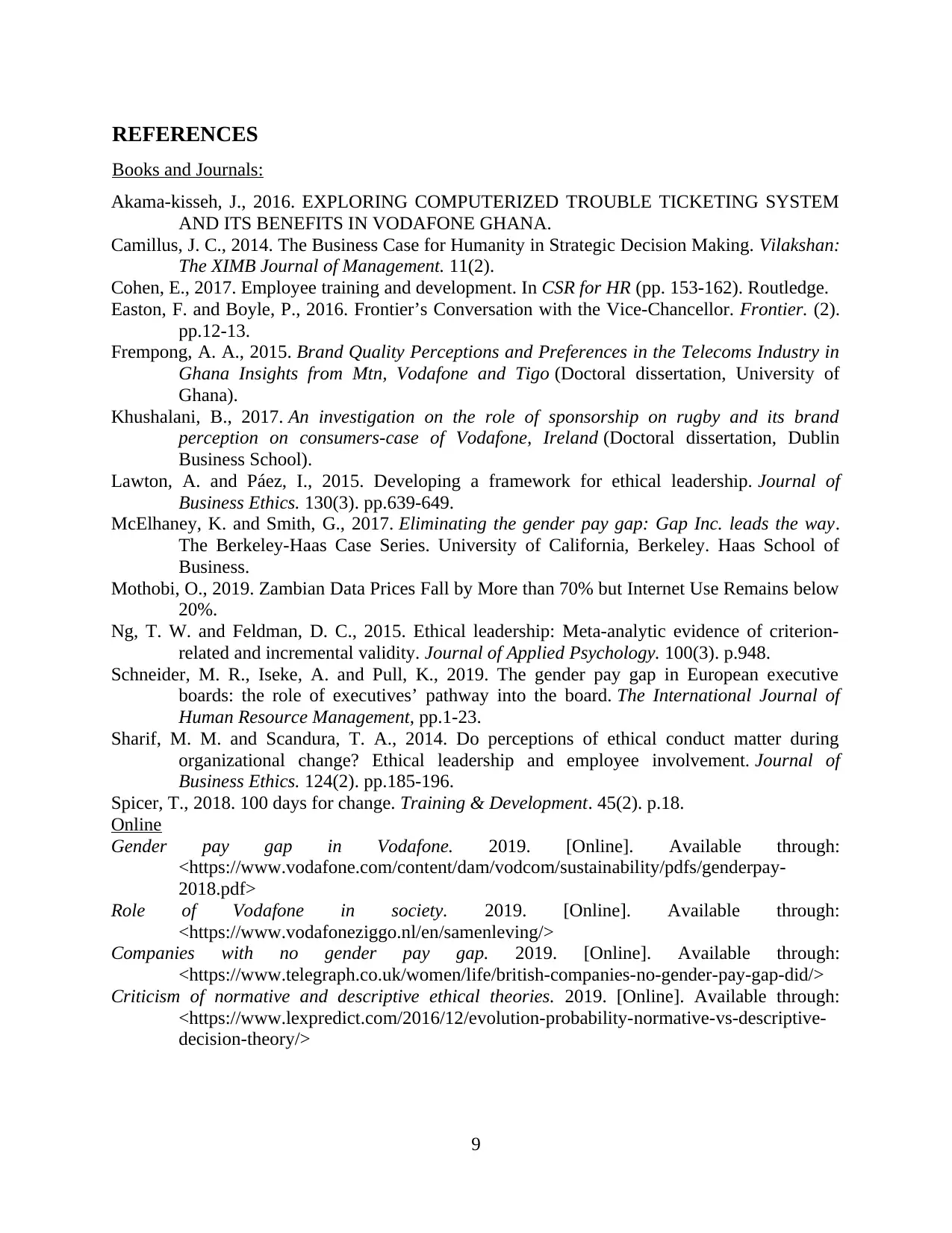
REFERENCES
Books and Journals:
Akama-kisseh, J., 2016. EXPLORING COMPUTERIZED TROUBLE TICKETING SYSTEM
AND ITS BENEFITS IN VODAFONE GHANA.
Camillus, J. C., 2014. The Business Case for Humanity in Strategic Decision Making. Vilakshan:
The XIMB Journal of Management. 11(2).
Cohen, E., 2017. Employee training and development. In CSR for HR (pp. 153-162). Routledge.
Easton, F. and Boyle, P., 2016. Frontier’s Conversation with the Vice-Chancellor. Frontier. (2).
pp.12-13.
Frempong, A. A., 2015. Brand Quality Perceptions and Preferences in the Telecoms Industry in
Ghana Insights from Mtn, Vodafone and Tigo (Doctoral dissertation, University of
Ghana).
Khushalani, B., 2017. An investigation on the role of sponsorship on rugby and its brand
perception on consumers-case of Vodafone, Ireland (Doctoral dissertation, Dublin
Business School).
Lawton, A. and Páez, I., 2015. Developing a framework for ethical leadership. Journal of
Business Ethics. 130(3). pp.639-649.
McElhaney, K. and Smith, G., 2017. Eliminating the gender pay gap: Gap Inc. leads the way.
The Berkeley-Haas Case Series. University of California, Berkeley. Haas School of
Business.
Mothobi, O., 2019. Zambian Data Prices Fall by More than 70% but Internet Use Remains below
20%.
Ng, T. W. and Feldman, D. C., 2015. Ethical leadership: Meta-analytic evidence of criterion-
related and incremental validity. Journal of Applied Psychology. 100(3). p.948.
Schneider, M. R., Iseke, A. and Pull, K., 2019. The gender pay gap in European executive
boards: the role of executives’ pathway into the board. The International Journal of
Human Resource Management, pp.1-23.
Sharif, M. M. and Scandura, T. A., 2014. Do perceptions of ethical conduct matter during
organizational change? Ethical leadership and employee involvement. Journal of
Business Ethics. 124(2). pp.185-196.
Spicer, T., 2018. 100 days for change. Training & Development. 45(2). p.18.
Online
Gender pay gap in Vodafone. 2019. [Online]. Available through:
<https://www.vodafone.com/content/dam/vodcom/sustainability/pdfs/genderpay-
2018.pdf>
Role of Vodafone in society. 2019. [Online]. Available through:
<https://www.vodafoneziggo.nl/en/samenleving/>
Companies with no gender pay gap. 2019. [Online]. Available through:
<https://www.telegraph.co.uk/women/life/british-companies-no-gender-pay-gap-did/>
Criticism of normative and descriptive ethical theories. 2019. [Online]. Available through:
<https://www.lexpredict.com/2016/12/evolution-probability-normative-vs-descriptive-
decision-theory/>
9
Books and Journals:
Akama-kisseh, J., 2016. EXPLORING COMPUTERIZED TROUBLE TICKETING SYSTEM
AND ITS BENEFITS IN VODAFONE GHANA.
Camillus, J. C., 2014. The Business Case for Humanity in Strategic Decision Making. Vilakshan:
The XIMB Journal of Management. 11(2).
Cohen, E., 2017. Employee training and development. In CSR for HR (pp. 153-162). Routledge.
Easton, F. and Boyle, P., 2016. Frontier’s Conversation with the Vice-Chancellor. Frontier. (2).
pp.12-13.
Frempong, A. A., 2015. Brand Quality Perceptions and Preferences in the Telecoms Industry in
Ghana Insights from Mtn, Vodafone and Tigo (Doctoral dissertation, University of
Ghana).
Khushalani, B., 2017. An investigation on the role of sponsorship on rugby and its brand
perception on consumers-case of Vodafone, Ireland (Doctoral dissertation, Dublin
Business School).
Lawton, A. and Páez, I., 2015. Developing a framework for ethical leadership. Journal of
Business Ethics. 130(3). pp.639-649.
McElhaney, K. and Smith, G., 2017. Eliminating the gender pay gap: Gap Inc. leads the way.
The Berkeley-Haas Case Series. University of California, Berkeley. Haas School of
Business.
Mothobi, O., 2019. Zambian Data Prices Fall by More than 70% but Internet Use Remains below
20%.
Ng, T. W. and Feldman, D. C., 2015. Ethical leadership: Meta-analytic evidence of criterion-
related and incremental validity. Journal of Applied Psychology. 100(3). p.948.
Schneider, M. R., Iseke, A. and Pull, K., 2019. The gender pay gap in European executive
boards: the role of executives’ pathway into the board. The International Journal of
Human Resource Management, pp.1-23.
Sharif, M. M. and Scandura, T. A., 2014. Do perceptions of ethical conduct matter during
organizational change? Ethical leadership and employee involvement. Journal of
Business Ethics. 124(2). pp.185-196.
Spicer, T., 2018. 100 days for change. Training & Development. 45(2). p.18.
Online
Gender pay gap in Vodafone. 2019. [Online]. Available through:
<https://www.vodafone.com/content/dam/vodcom/sustainability/pdfs/genderpay-
2018.pdf>
Role of Vodafone in society. 2019. [Online]. Available through:
<https://www.vodafoneziggo.nl/en/samenleving/>
Companies with no gender pay gap. 2019. [Online]. Available through:
<https://www.telegraph.co.uk/women/life/british-companies-no-gender-pay-gap-did/>
Criticism of normative and descriptive ethical theories. 2019. [Online]. Available through:
<https://www.lexpredict.com/2016/12/evolution-probability-normative-vs-descriptive-
decision-theory/>
9
1 out of 11
Related Documents
Your All-in-One AI-Powered Toolkit for Academic Success.
+13062052269
info@desklib.com
Available 24*7 on WhatsApp / Email
![[object Object]](/_next/static/media/star-bottom.7253800d.svg)
Unlock your academic potential
Copyright © 2020–2026 A2Z Services. All Rights Reserved. Developed and managed by ZUCOL.





